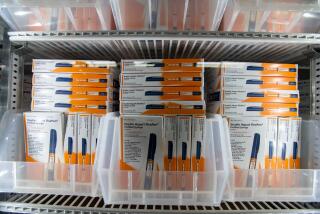Teva pays $1.2 billion to settle pay-for-delay allegations
- Share via
Federal regulators announced Thursday that Teva Pharmaceuticals Industries will pay $1.2 billion to settle charges that one of its subsidiaries illegally blocked the launch of low-cost generic versions of the blockbuster sleeping pill Provigil.
The settlement is a major victory in the federal government’s ongoing campaign against a common drug industry practice known as “pay-for-delay” deals. Drugmakers have long maintained that the deals help resolve costly patent litigation between branded drugmakers and their generic competitors. But Federal Trade Commission officials have argued for over a decade that the agreements keep cheaper forms of medicines off the market, driving up costs for consumers and the U.S. health system.
Thursday’s settlement stems from charges brought in 2008 against Cephalon Inc., which was acquired by Teva in 2012. The FTC alleged that Cephalon paid four generic firms more than $300 million to delay launching their low-cost versions of Provigil drugs until 2012. Provigil is approved to treat excessive sleepiness and posted U.S. sales exceeding $1 billion in 2008, accounting for about half of Cephalon’s sales that year.
FTC officials declined to estimate how much money Cephalon generated in the years it benefited from a lack of competition. But FTC Chairwoman Edith Ramirez said the settlement is the largest of its kind to target such deals, sometimes called “reverse settlements.”
“I think it will send a very strong signal to any company that is considering entering into a deal that is anticompetitive,” she told reporters at a press conference.
The $1.2 billion fee from Teva would be paid to pharmacies, insurers, wholesalers and other businesses “who overpaid because of Cephalon’s illegal conduct,” the government stated. The settlement agreement also bars Teva from entering into similar reverse settlement deals.
Last month Teva reached a separate $512 million settlement with drug wholesalers and retailers who brought a class action against the company stemming from the same issues.
Generic drugs account for about 86 percent of all American prescriptions for medicines, but a far smaller percentage of the $329 billion spent on drugs each year, according to IMS Health. The majority of U.S. prescription drug spending goes toward branded medicines still under patent.
Traditionally, generic drugmakers challenge the patents on branded drugs, seeking to show that they are flawed or invalid. A successful patent challenge can win the generic company rights to market its own versions. Sometimes these lawsuits are settled by both parties to avoid lengthy patent litigation that might otherwise drag on for years.
However, in reverse settlement deals, FTC argues that branded drugmakers are actually paying their competitors in return for dropping their litigation and agreeing to stay off the market for a specified time. This in turn clogs up the pipeline for cost-saving generic drugs.
Despite its criticisms, the FTC has had a mixed track record at challenging the agreements. Two appeals courts in 2005 upheld the legality of agreements reached by Schering-Plough Corp. and AstraZeneca PLC with generic companies. Since then, lucrative settlements between generic and branded drugmakers have flourished.
But in 2013, the Supreme Court ruled in a key case that reverse settlement agreements can run afoul of federal antitrust laws, and therefore be challenged in court.
The FTC’s court case against Teva was scheduled to begin June 1 in U.S. District Court for the Eastern District of Pennsylvania.
“Today’s landmark settlement is an important step in the FTC’s ongoing effort to protect consumers from anticompetitive pay for delay settlements, which burden patients, American businesses, and taxpayers with billions of dollars in higher prescription drug costs,” Ramirez, said in a statement.
Teva Pharmaceuticals Industries Limited is the world’s largest generic drugmaker, with global headquarters in Israel.
More to Read
Inside the business of entertainment
The Wide Shot brings you news, analysis and insights on everything from streaming wars to production — and what it all means for the future.
You may occasionally receive promotional content from the Los Angeles Times.










